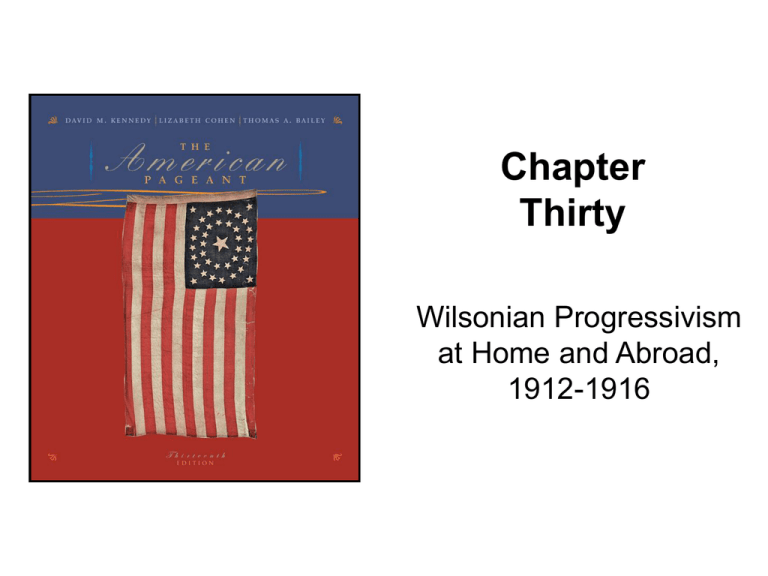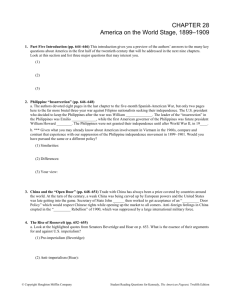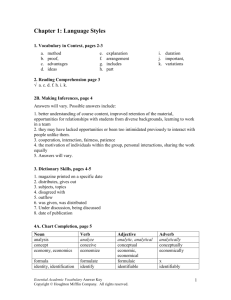
Chapter
Thirty
Wilsonian Progressivism
at Home and Abroad,
1912-1916
Kennedy, The American Pageant
Chapter 29
The basic contrast between the two
progressive candidates, Roosevelt and
Wilson, was that
1. Roosevelt wanted genuine political and social reforms, while
Wilson wanted only to end obvious corruption.
2. Roosevelt wanted to promote free enterprise and
competition, while Wilson wanted the federal government to
regulate the economy and promote social welfare.
3. Roosevelt wanted the federal government to regulate the
economy and promote social welfare, while Wilson wanted
to restore economic competition and social equality.
4. Roosevelt wanted to focus on issues of jobs and economic
growth, while Wilson wanted social legislation to protect
women, children, and city-dwellers.
Copyright © Houghton Mifflin Company. All rights reserved.
29-2
Kennedy, The American Pageant
Chapter 29
The basic contrast between the two
progressive candidates, Roosevelt and
Wilson, was that
3. Roosevelt wanted the federal government to regulate
the economy and promote social welfare, while Wilson
wanted to restore economic competition and social
equality.
Hint: See page 680.
Copyright © Houghton Mifflin Company. All rights reserved.
29-3
Kennedy, The American Pageant
Chapter 29
The candidate who finished second
in both electoral and popular votes in
1912 was
1. President William Howard Taft.
2. former President Theodore Roosevelt.
3. New Jersey Governor Woodrow Wilson.
4. Socialist candidate Eugene V. Debs.
Copyright © Houghton Mifflin Company. All rights reserved.
29-4
Kennedy, The American Pageant
Chapter 29
The candidate who finished second
in both electoral and popular votes in
1912 was
2. former President Theodore Roosevelt.
Hint: See page 681.
Copyright © Houghton Mifflin Company. All rights reserved.
29-5
Kennedy, The American Pageant
Chapter 29
Strong features of the background
that Woodrow Wilson brought to
politics were
1. his extensive experience with ordinary people and
his struggle to rise in the world.
2. his personal knowledge of business and
experience with foreign policy.
3. his strong religious upbringing and his skill with
both the oral and written word.
4. his knowledge of ethnic voters and his popularity
with urban bosses.
Copyright © Houghton Mifflin Company. All rights reserved.
29-6
Kennedy, The American Pageant
Chapter 29
Strong features of the background
that Woodrow Wilson brought to
politics were
3. his strong religious upbringing and his skill with
both the oral and written word.
Hint: See page 681.
Copyright © Houghton Mifflin Company. All rights reserved.
29-7
Kennedy, The American Pageant
Chapter 29
The “triple wall of privilege” that
Wilson set out to reform consisted of
1. farmers, shippers, and the military.
2. the tariffs, the banks, and the trusts.
3. the universities, private dining clubs, and political
bosses.
4. congressional leaders, lobbyists, and lawyers.
Copyright © Houghton Mifflin Company. All rights reserved.
29-8
Kennedy, The American Pageant
Chapter 29
The “triple wall of privilege” that
Wilson set out to reform consisted of
2. the tariffs, the banks, and the trusts.
Hint: See page 683.
Copyright © Houghton Mifflin Company. All rights reserved.
29-9
Kennedy, The American Pageant
Chapter 29
The Federal Reserve System that
Wilson passed through Congress
essentially solved the long-standing
American problem of
1. providing adequate reserves of coal and oil in
case of war.
2. developing and maintaining an adequate gold
reserve to back the currency.
3. regulating unfair trade practices and misleading
advertising.
4. regulating the banks and establishing a stable but
flexible currency.
Copyright © Houghton Mifflin Company. All rights reserved.
29-10
Kennedy, The American Pageant
Chapter 29
The Federal Reserve System that
Wilson passed through Congress
essentially solved the long-standing
American problem of
4. regulating the banks and establishing a stable but
flexible currency.
Hint: See pages 683–684.
Copyright © Houghton Mifflin Company. All rights reserved.
29-11
Kennedy, The American Pageant
Chapter 29
The fundamental purpose of the
Federal Trade Commission was to
regulate
1. unfair trade practices, misleading advertising, and
the adulteration of consumer products.
2. the railroads, telephones, and telegraph system.
3. international trade between the United States and
Europe.
4. direct marketers and door-to-door salesmen.
Copyright © Houghton Mifflin Company. All rights reserved.
29-12
Kennedy, The American Pageant
Chapter 29
The fundamental purpose of the
Federal Trade Commission was to
regulate
1. unfair trade practices, misleading advertising, and
the adulteration of consumer products.
Hint: See page 684.
Copyright © Houghton Mifflin Company. All rights reserved.
29-13
Kennedy, The American Pageant
Chapter 29
Woodrow Wilson initially attempted to
reverse the foreign policies of
Theodore Roosevelt and William
Howard Taft by
1. challenging the peace settlement that Roosevelt
had negotiated between Russia and Japan.
2. vigorously opposing imperialistic American actions
in China and Latin America.
3. declaring that American would not tilt toward
Britain in its conflict with Germany.
4. declaring that he would no longer support a “twoocean” American navy.
Copyright © Houghton Mifflin Company. All rights reserved.
29-14
Kennedy, The American Pageant
Chapter 29
Woodrow Wilson initially attempted to
reverse the foreign policies of
Theodore Roosevelt and William
Howard Taft by
2. vigorously opposing imperialistic American actions
in China and Latin America.
Hint: See page 685.
Copyright © Houghton Mifflin Company. All rights reserved.
29-15
Kennedy, The American Pageant
Chapter 29
Into which of the following Latin
American countries did Woodrow
Wilson not ending up dispatching
American troops?
1. Haiti.
2. Mexico.
3. Panama.
4. the Dominican Republic.
Copyright © Houghton Mifflin Company. All rights reserved.
29-16
Kennedy, The American Pageant
Chapter 29
Into which of the following Latin
American countries did Woodrow
Wilson not ending up dispatching
American troops?
3. Panama.
Hint: See pages 685–687.
Copyright © Houghton Mifflin Company. All rights reserved.
29-17
Kennedy, The American Pageant
Chapter 29
The dangerous “string” that Germany
attached to its “Sussex pledge” to
refrain from attacking Allied shipping
was
1. that Germany would freeze all American assets
and detain American citizens in Germany if the
United States sent military aid to Britain.
2. that the Allies had to end their anti-German
propaganda in America.
3. that Americans could no longer travel on neutral
passenger ships.
4. that the Allies had to modify what Germany
considered an illegal blockade against Germany.
Copyright © Houghton Mifflin Company. All rights reserved.
29-18
Kennedy, The American Pageant
Chapter 29
The dangerous “string” that Germany
attached to its “Sussex pledge” to
refrain from attacking Allied shipping
was
4. that the Allies had to modify what Germany
considered an illegal blockade against Germany.
Hint: See page 691.
Copyright © Houghton Mifflin Company. All rights reserved.
29-19
Kennedy, The American Pageant
Chapter 29
Wilson’s most effective slogan in the
campaign of 1916 was
1. “The full dinner pail.”
2. “Free and unlimited coinage of silver in the ratio of
sixteen to one.”
3. “A war to make the world safe for democracy.”
4. “He kept us out of war.”
Copyright © Houghton Mifflin Company. All rights reserved.
29-20
Kennedy, The American Pageant
Chapter 29
Wilson’s most effective slogan in the
campaign of 1916 was
4. “He kept us out of war.”
Hint: See page 693.
Copyright © Houghton Mifflin Company. All rights reserved.
29-21



